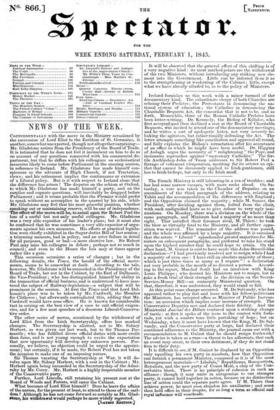NEWS OF THE WEEK.
COINCIDENTALLY with the move in the Ministry occasioned by -the ,soccession of Lord Eliot to the Earldom of St. Germains, is another, somewhat unexpected, though not altogether surprising— Mr. Gladstone retires from the Presidency of the Board of Trade. It_is intimated that he does not feel it incumbent on him to do so on account of any questions connected with his commercial de- partment, but that he differs with his colleagues on ecclesiastical measures likely to come before Parliament in the ensuing session, in reference to Ireland. Mr. Gladstone has made himself con- spicuous as the advocate of High Church, if not Tractarian, views ; and his retirement implies the continuance or extension of a Liberal policy. But is it with respect to Ireland alone that the difference has arisen ? The disputes on the schism at Oxford, -to which Mr: Gladstone has made himself a party, and on the surplice and cognate questions, will inevitably be dragged before Parliament ; and it seems probable that the Premier would prefer to speak without an accomplice in the quarrel by his side, while Mr. Gladstone may feel that his most graceful position, whether speaking out or maintaining reserve will be one of independence. The effect of the move will be, to entail upon Sir Robert Peal the loss of a useful but not only useful colleague. Mr. Gladstone was a very able expositor of his leader's plans; but it must also he confessed that he was sometimes a very able expositor of argu- ments against his own measures. His efforts at practical legisla- tion were chiefly exhibited in the Sugar-duties Bill of last session; a trimming measure, bad in policy, and an utter failure in detai "For all purposes, good or bad—a mere abortive law. Sir Robert Peel may miss his colleague in debate ; perhaps not so much in -council ; and even in the House the loss may at times appear rather like a gain. This secession occasions a series of changes ; but in the following details, the Times, the herald of the official move- ments, seems to be somewhat at fault. According to the tale, however, Mr. Gladstone will be succeeded in the Presidency of the Board of Trade, but not in the Cabinet, by the Earl of Dalhousie, the Vice-President; who has distinguished himself by ability in the transaction of official business, and is understood to have mas- tered the subject of Railway-legislation—a subject that will be prominent in the session. At first the Times said that Lord Dal- housie's place was to be taken by Mr. Cardwell, the Member for Clitheroe • but afterwards contradicted this, adding that Mr. Cardwell would have some office. He is known for considerable tact in seizing on the best view of a case to suit official exigen- cies, and for a few neat speeches of a decorous Liberal-Conserva- tive order.
The other series of moves, occasioned by the withdrawal of Lord Eliot from the Irish Secretaryship, offers less marked changes. The Secretaryship is allotted, not to Mr. Sidney Herbert, as was given out last week, but to Sir Thomas Fre- mantle; who has fulfilled divers official duties with more credit than fame, and is not young enough to excite the expectation that new opportunity will develop any unknown powers. Per- sonally, we believe, no objection could be urged to the appoint- ment • but certainly, if' it be made, Sir Robert Peel has not taken the occasion to make one of an imposing nature. Thomas vacating the Secretaryship at War, it will de- volve upon Mr. Sidney Herbert, with a seat in the dabinet ; Mr. Herbert again being succeeded in the Secretaryship of the Admi- ralty by Mr. Corry. Mr. Herbert is a highly respectable member of the Conservative party.
Further Lord Lincoln, still retaining his present seat at the
Board of Woods and Forests, will enter the Cabinet.
What becomes of Lord Eliot himself? Does he leave the affairs of the nation, for the present at least, to attend to those of the earl- dom ? Although he has not come forward so notably as Mr. Glad- stone, his withdrawal would perhaps be more widely rejreUed.
It will be observed that the general effect of this shifting is of a very negative kind : its most marked points are the withdrawal of the two Ministers, without introducing any striking new ele- ment into the Government. Little can be inferred from it as to the strengthening or weakening of the Cabinet ; little, except what we have already alluded to, as to the policy of Ministers.


























